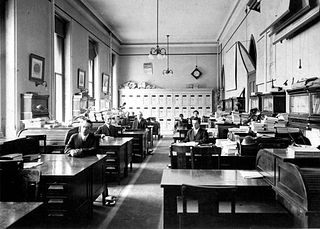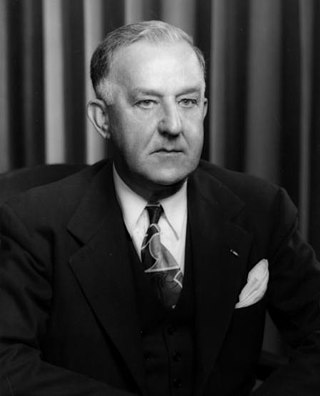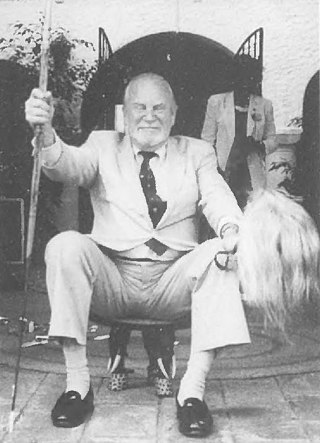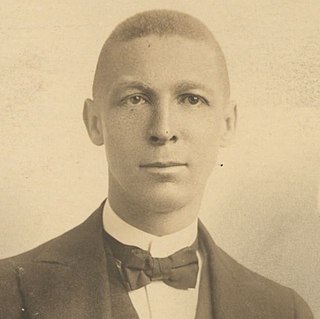
The press gallery is the part of a parliament, or other legislative body, where political journalists are allowed to sit or gather to observe and then report speeches and events. This is generally one of the galleries overlooking the floor of the house and can also include separate offices in the legislative or parliamentary buildings accorded to the various media outlets, such as occurs with the Strangers Gallery in the British House of Commons or the Canberra Press Gallery in the Australian Parliament.

Stephen Tyree Early was a U.S. journalist and government official. He served as the third White House press secretary under Franklin D. Roosevelt from 1933 to 1945 and as the acting press secretary under President Harry S. Truman in 1950 after the sudden death of Charles Griffith Ross. Early served as press secretary longer than any other person.

Smith Hempstone was a journalist, author, and the United States ambassador to Kenya in 1989–93. He was a vocal proponent of democracy, advocating free elections for Kenya.

Ethel Lois Payne was an American journalist, editor, and foreign correspondent. Known as the "First Lady of the Black Press," she fulfilled many roles over her career, including columnist, commentator, lecturer, and freelance writer. She combined advocacy with journalism as she reported on the Civil Rights Movement during the 1950s and 1960s. Her perspective as an African American woman informed her work, and she became known for asking questions others dared not ask.
The White House Correspondents' Association (WHCA) is an organization of journalists who cover the White House and the president of the United States. The WHCA was founded on February 25, 1914, by journalists in response to an unfounded rumor that a United States congressional committee would select which journalists could attend press conferences of President Woodrow Wilson.
The National Newspaper Publishers Association (NNPA), formerly the National Negro Publishers Association, is an association of African American newspaper publishers from across the United States. It was established in 1940 and took its current name in 1956. Its headquarters was in Louisville, Kentucky.

Albert Merriman Smith was an American wire service reporter, notably serving as White House correspondent for United Press International and its predecessor, United Press. He won the Pulitzer Prize in 1964 for his coverage of the assassination of John F. Kennedy and was awarded the Presidential Medal of Freedom in 1969 by Lyndon B. Johnson.

Abilio James Acosta is an American broadcast journalist, anchor and the chief domestic correspondent for CNN. Previously, Acosta served as the network's chief White House correspondent during the Trump administration, in which he gained national attention for President Donald Trump's clashes with him at press briefings. Acosta also covered the Obama administration as CNN's senior White House correspondent. As Trump was about to leave office, it was announced on January 11, 2021 that Acosta had been appointed Anchor and Chief Domestic Correspondent for CNN.

Alice Allison Dunnigan was an American journalist, civil rights activist and author. Dunnigan was the first African-American female correspondent to receive White House credentials, and the first black female member of the Senate and House of Representatives press galleries. She wrote an autobiography entitled Alice A. Dunnigan: A Black Woman's Experience. She is commemorated by an official Kentucky Historical Society marker.
Louis R. Lautier (1897-1962) was the first African-American journalist admitted to the White House Correspondents' Association (1951) and to the National Press Club (1955).
Laurence Todd (1882–1957) was an American journalist who worked as a news agency correspondent in Washington, DC. A committed radical, Todd worked as personal secretary to Socialist Congressman Meyer London from 1915 to 1916. Todd is best remembered as a correspondent for the Soviet news agency TASS for nearly three decades, a relationship about which he was interrogated in a hearing of the United States Senate in April 1956.

The Atlanta Daily World is the oldest black newspaper in Atlanta, Georgia, founded in 1928. Currently owned by Real Times Inc., it publishes daily online. It was "one of the earliest and most influential black newspapers."
The Chicago Defender is a Chicago-based online African-American newspaper. It was founded in 1905 by Robert S. Abbott and was once considered the "most important" newspaper of its kind. Abbott's newspaper reported and campaigned against Jim Crow-era violence and urged black people in the American South to settle in the north in what became the Great Migration. Abbott worked out an informal distribution system with Pullman porters who surreptitiously took his paper by rail far beyond Chicago, especially to African American readers in the southern United States. Under his nephew and chosen successor, John H. Sengstacke, the paper dealt with racial segregation in the United States, especially in the U.S. military, during World War II. Copies of the paper were passed along in communities, and it is estimated that at its most successful, each copy was read by four to five people.

Roscoe Conkling Simmons was an American orator, journalist, and political activist. The nephew of Booker T. Washington, he wrote a column from Washington, D.C. about African-American issues for the Chicago Tribune and was influential in the Republican Party.
Claude Albert Barnett was an American journalist, publisher, entrepreneur, philanthropist, civic activist, Pan-Africanist, and founder of the Associated Negro Press (ANP). He started the first international news agency for black newspapers. He was an advocate against segregation in the military and blood supply. He was an activist force in journalism. He promoted Pan-Africanism. The (ANP) documented the Civil Rights Movement in the United States of America, and struggles for independence in Africa. Associated Negro Press was a Pan-African news service. Claude Barnett, Robert S. Abbott, and John H. Johnson were three of the most influential African-American media entrepreneurs in the 20th century. They were based in Chicago, Illinois. Barnett is said to have advanced the role of the Black Press in press coverage, news sharing, advertising, public relations, and professionalism.
The Associated Negro Press (ANP) was an American news service founded in 1919 in Chicago, Illinois by Claude Albert Barnett. The ANP had correspondents, writers, reporters in all major centers of the black population in the United States of America. It supplied news stories, opinions, columns, feature essays, book and movie reviews, critical and comprehensive coverage of events, personalities, and institutions relevant to black Americans. As the ANP grew into a global network. It supplied the vast majority of black newspapers with twice weekly packets.
Josh Dawsey is an American journalist who is a political investigations and enterprise reporter for The Washington Post.
Homer Smith Jr (1909–1972) was an American journalist and postal worker. He moved from the United States to the Soviet Union in 1932.
Simon Ateba is a Cameroonian journalist who is the owner and White House correspondent of the website Today News Africa.








